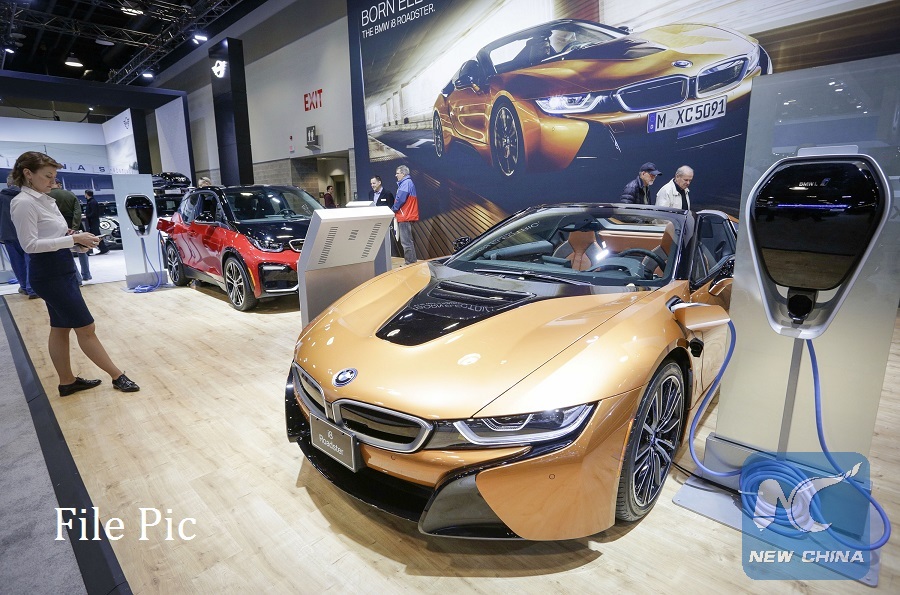
A BMW i8 is seen at the 98th Vancouver International Auto Show in Vancouver, Canada, March 28, 2018. Over 400 vehicles were displayed at the five-day show, opened on March 28. (Xinhua/Liang Sen)
BERLIN, June 2 (Xinhua) -- The refusal of Washington to renew a temporary exemption of the European Union (EU) from tariffs on steel and aluminium imports met with further criticism and concern in Germany on Friday.
Gabriel Felbermayer, trade expert at the Ifo institute in Munich, said that Washington was making a serious mistake by breaching the rules of the World Trade Organization (WTO) as the Geneva-based organization also protected its own interests.
He continued that the Unite States could no longer dictate its preferences to others in trade policy and hence stood to benefits from the WTO's dispute settlement mechanisms as well.
As of June 1, European producers have become subject to a 25 percent tariff on steel and a 10 percent tariff on aluminium imports.
EU UNITED FRONT URGED
The Ifo expert warned that the development was likely to signal a looming "cold war' between Europe and the U.S. over trade. While economic damage would be "limited" at first according to Felbermayer, it had to be feared that the steel and aluminium tariffs were "only the beginning of a row of further U.S. measures."
In any case, Felbermayer recommended the EU maintain a united front in opposition to the measures together with other international partners who were interested in upholding a multilateral system of fair trade.
He said the bloc should hereby not shy away from targeting the sectors of the export-oriented U.S. economy which were "most vulnerable" to retaliation, such as highly-profitable digital services.
Gustav Horn, director of the Duesseldorf-based Macroeconomic Policy Institute (IMK) opined that the U.S. economy would be more severely-affected by the tariffs than Europe.
He suggested the EU remain calm in order to avoid escalation of the trade conflict.
Horn thought that Brussels could rely on a few small targeted measures to signal its principle readiness to retaliate while allowing domestic "pressure to build on the U.S. president to reverse course."
Similarly, Volker Treier, trade expert at the German Association of the Chambers of Industry and Commerce (DIHK), told the press that Trump's "America First" doctrine would make the United States less attractive as a business location to investors.
The EU has issued a ten-page list of tariffs on U.S. goods ranging from Harley-Davidson motorcycles to bourbon, as retaliation to U.S. steel tariffs.
GREATER RISK: POTENTIAL TARIFFS ON CARS
The German steel producer Salzgitter AG praised the EU's unified stance and competence in the management of the conflict.
Its chief executive officer Joerg Fuhrmann said, however, the direct implications of U.S. protectionist tariffs for Salzgitter "are limited".
German carmaker BMW said that it would assess the impact of U.S. tariffs on its operative business. The Munich-based company currently sources more than 70 percent of the steel it requires for car manufacturing at its U.S. Spartanburg-plant locally and said it would look into raising this share further.
BMW's rival automotive corporation Volkswagen issued a statement, saying that it had received the news of the higher tariffs on aluminium and steel with "regret and concern." The Wolfsburg-based group reiterated earlier warnings that there would only be losers from a trade war and called for a program of mutual tariff reductions as outlined in plans for the proposed U.S.-EU trade agreement TTIP, abandoned by the Trump administration.
Aluminium and steel are both important resources for German carmakers. Nevertheless, the powerful national industry has so far downplayed the economic implications of the new U.S. tariffs while highlighting the greater risk posed by potential additional tariffs on car imports as threatened recently by Washington.

